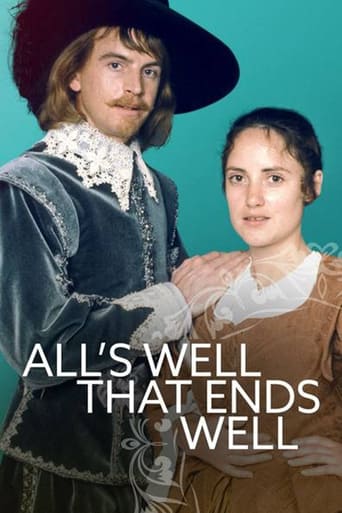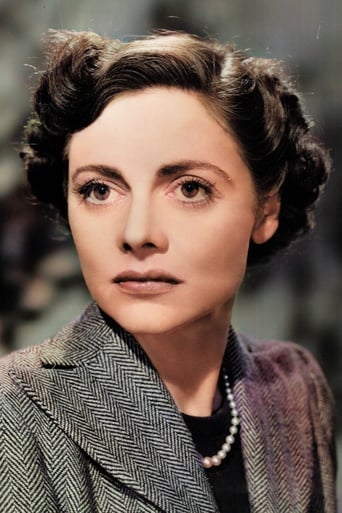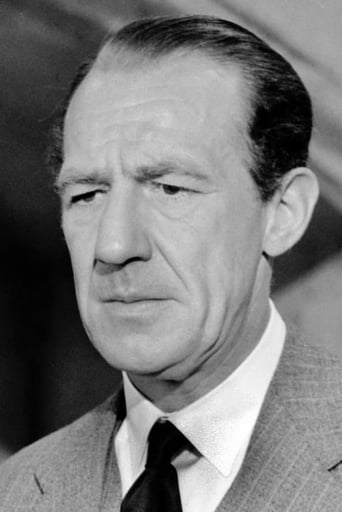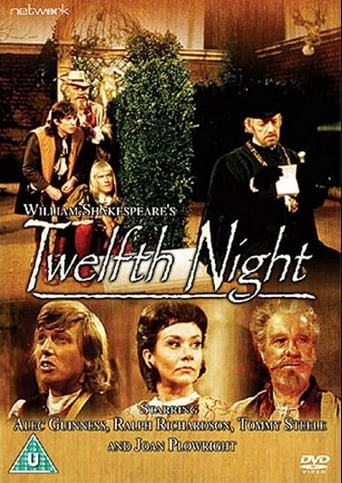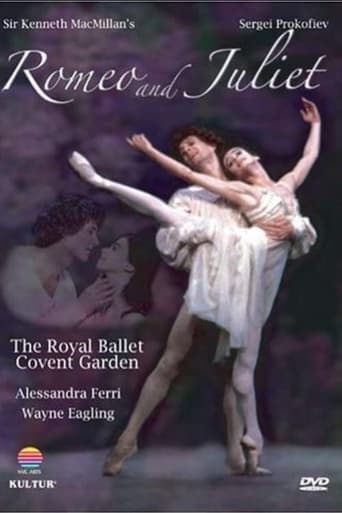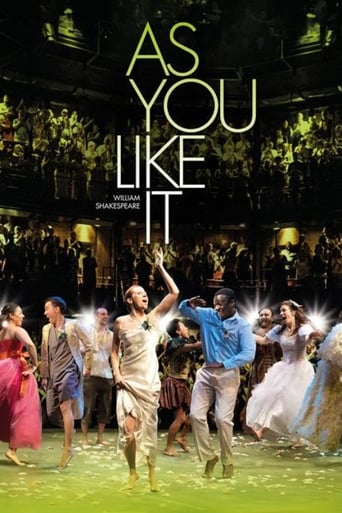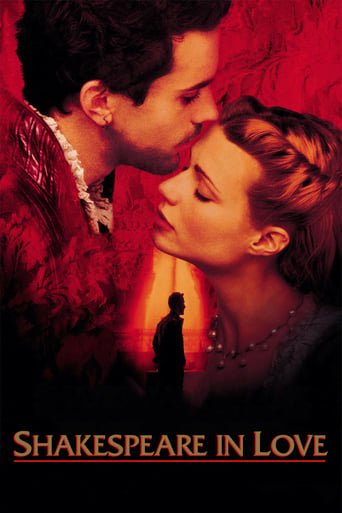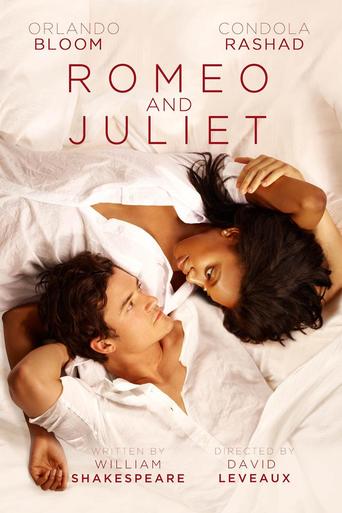All's Well That Ends Well (1981)
Helena loves Bertram, but he's of noble birth, while she's just a doctor's daughter. But Bertram is at the court of the King of France, who is ill, and Helena has a remedy that might cure him and win her the right to marry Bertram. But does Bertram want to marry her?
Watch Trailer
Cast
Similar titles
Reviews
Purely Joyful Movie!
How sad is this?
At first rather annoying in its heavy emphasis on reenactments, this movie ultimately proves fascinating, simply because the complicated, highly dramatic tale it tells still almost defies belief.
It’s not bad or unwatchable but despite the amplitude of the spectacle, the end result is underwhelming.
This is a simple comedy by Shakespeare. Nothing to deface the world with laughter or to haunt your sleepless nights. But we find in this light comedy some themes that are dear to our playwright. Love, and love, and love. The love of a girl for a boy, of a young woman for a young man, a love that cannot exist because of the social difference between the two. The ingenuity and creativity of the young woman who saves the life of the king with the medical knowledge she received from her father, and the promise of the King to give her any man she wants. She chooses the young man who is well obliged to oblige and get married, which does not mean consume the union. He goes to the war and the young woman is going to follow and with some other young women she will trick him into impregnating her and an exchange of rings will make the situation very difficult for him. So the union has been consumed sort of on the side and the young man graciously accepts his defeat and declares his love. That is slightly artificial but Shakespeare in his comedies at times is slightly superficial. Another theme that is dealt with nicely is the "captain" that takes care of the young noble man we are dealing with when serving in the military. He is a liar, he is a coward, he is also running after skirts as much as he can. Shakespeare disgraces him with some kind of conjuration and he ends up nearly a beggar, stinking to hell and blazes and ready to do anything to get a penny. That's a very simple version of what Falstaff is going to be later but he is funny in some ways though pathetic. The BBC is adding to that play that is mostly taking place in France, and a little in Florence, a setting and costumes that are, in the house of the young man, very close to the Flemish school of painting, Rembrandt and the Van Eyck brothers. That gives to the play a post-Renaissance touch that is slightly surprising.Dr Jacques COULARDEAU, University Paris 1 Pantheon Sorbonne, University Paris 8 Saint Denis, University Paris 12 Créteil, CEGID
Though not nearly as much fun as some of Shakespeare's better comedies, this is nevertheless good fun to watch. Although it irritates me to see Shakespeare performed in stodgy period dress, it's still a well-acted piece.I was especially fond of Peter Jeffrey as the foppish Parolles. I like Shakespeare when he portrays upper-class idiots as he has a tendency in too many of his plays ("Measure for Measure", "A Midsummer Night's Dream")to portray the working classes as fools or rustics whose natural place is subservient to the lords and ladies who are so often his principal characters. This is patronising, but is some way made up for here. Jeffrey is excellent fun and his verbal duels with Micheal Horden's Lafeu are the best scenes in the play.Angela Down is very good is the smart Helena, and Ian Charleson has the right mix of charm and sullenness as Bertram, her unwilling choice of husband. Pippa Guard is very fetching as the maid Diana, and Donald Sinden gives a good performance as the King of France.By no means a classic of Shakespeare's, it's still a good watch.
--spoilers-- I loved this version. The Beeb have used Vermeer paintings for Bertram's home, notably the Girl at the Spinet (I think that's the title), but done it all in black and white. Amazing set. Helena plays the spinet at one stage and how interesting as I'd never seen a spinet keyboard that close before - how cramped the keyboard is. Every character is acted perfectly. Bertram is hissily horrid to nice kind Helena, and wouldn't we ladies all like to smack him for his ill manners? Time and again in the past women were forced into marriages with men they detested and how many of those men who had the freedom to choose their bride ever cared if she was miserable? But Bertram throws a fit when ordered by the King to marry Helena because he despises her "lowly rank". I can't imagine even the very grateful king would have forced a nobleman in his court to marry a girl much below his class and it was clear all the other gentlemen questioned were happy to have her if she'd chosen so. What's with Bertram's arrogance?! It makes a good story as Bertram defies the King somewhat by refusing to consummate the marriage and then has the cheek to use the dowry the king has given Helena to pay for his accoutrements and journey off to war, leaving Helena a spiteful note telling her he won't love her until she has got a valuable family ring off his finger and can prove he's made her pregnant - two feats he's certain she can never achieve as he also tells her he'll never see her again. He sends a thoroughly mean letter to his mother too, saying there's nothing for him at home until his unwanted wife is dead. Not a thought for his poor old mother maybe never seeing him again. Of course Helena manages to get the ring and the pregnancy, although she's exceedingly fortunate that the Florentine girl Diana who helps Helena trap Bertram back into his marriage isn't after Bertram herself when he absolutely ruthlessly sets out to seduce her. But Diana is sensible. She knows Bertram's married and won't give herself without marriage. Disliking Bertram's deceit, she and her mother and some friends are happy to trick Bertram so that Helena gets the ring and the pregnancy. Mean Bertram is thoroughly trapped though he doesn't know it yet.He hears that his wife is dead and goes home. Everyone including the King congregates there for the final scene. There's a fair bit of fuss about rings being in the possession of the wrong people and the king gets annoyed with Bertram again. Diana and her mother and Helena also arrive though Helena keeps out of sight whilst Diana insists Bertram must marry her. Bertram is in a fix because now his wife's dead he's decided he loves her. But it's all sorted out when Helena appears. Bertram gets off pretty lightly, frankly.
The production design of this video is based on paintings by Vermeer, Rembrandt, de la Tour and others. It is uniformly striking and lovely, and will live in the memory.The acting performances are good, but uneasy, perhaps reflecting the problematic nature of the play. Ian Charleson's Bertram is cold, Angela Down's Helen is weepy, and so they stay for yards and yards of iambic pentameter. Only Donald Sinden as the King errs on the side of too much emotional variety, but it's hard to remember a Sinden performance in which he wasn't an explosive law unto himself. Michael Hordern and Peter Jeffrey battle deftly as Lafeu and Parolles, while Paul Brooke's Lavache is more menacing than witty. Pippa Guard's Diana is unfailingly dignified, and a small cameo by the aged Valentine Dyall proves unexpectedly moving. And as the Countess, Celia Johnson's presence is every bit as sympathetic here as it was in "Brief Encounter" 35 years earlier.Any dissatisfactions mentioned in this review are just quibbles, however, as the play is rare and worthwhile, the production gratifies the eye, and no one writes a closing reconciliation scene like Shakespeare. Indeed, All's Well That Ends Well.
